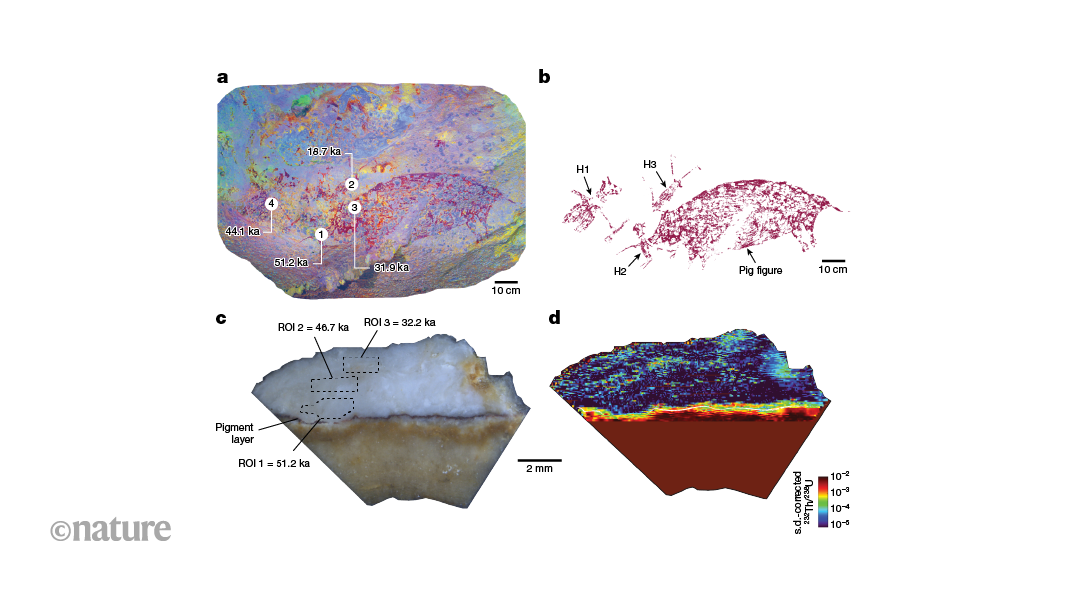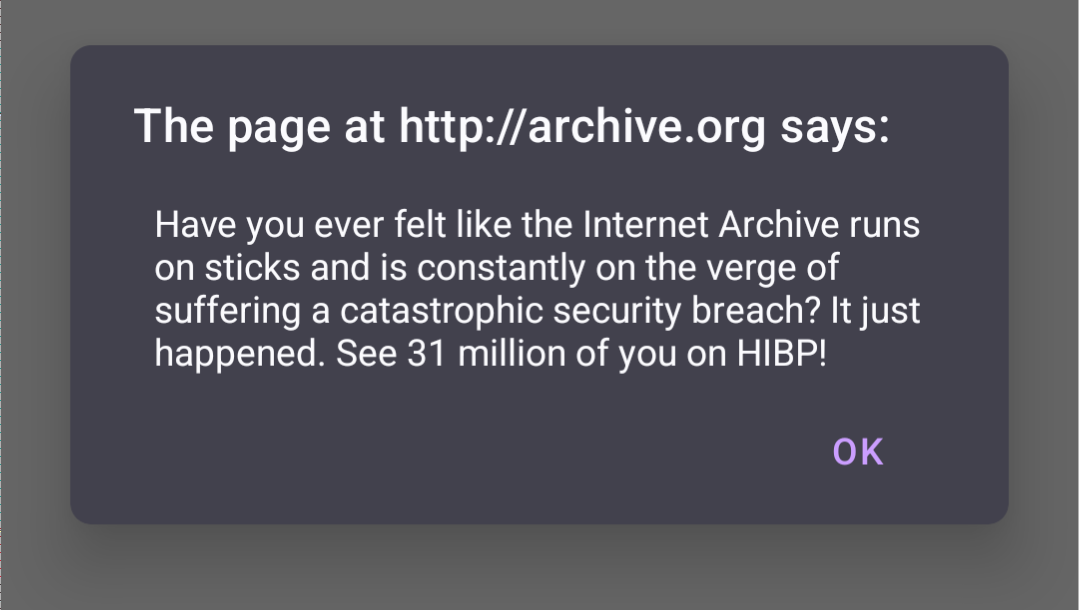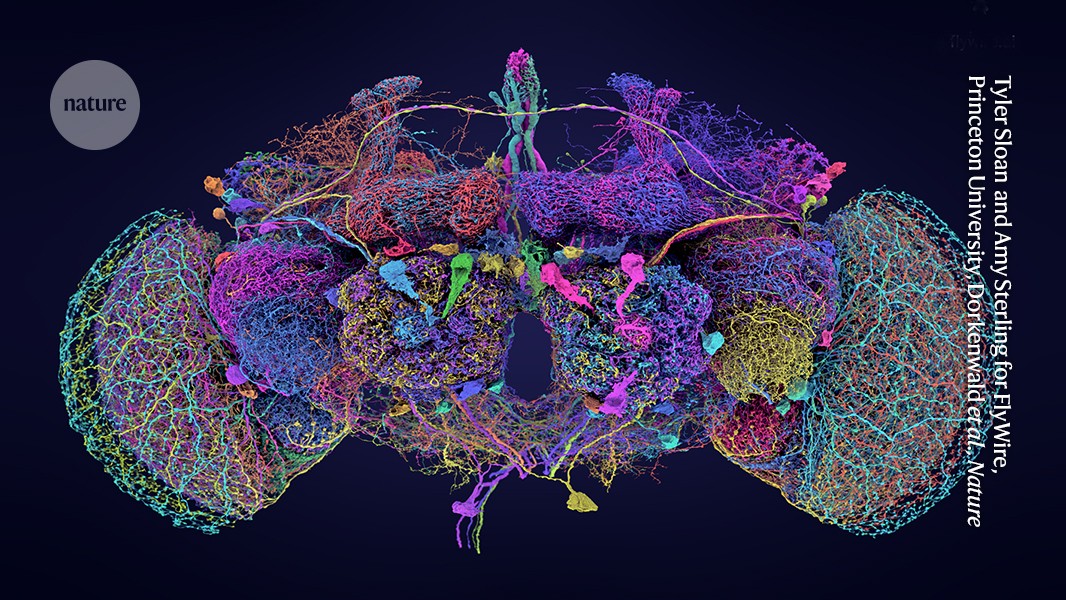This is a good point… I’m more used to biomedical papers where this author list would be considered typical or even short, but yeah the affiliations seem to state that there are four PIs on this paper which is wild… don’t know what to make of it. If someone knows archaeology better plz inform
Ask me about:
- Science (biology, computation, statistics)
- Gaming (rhythm, rogue-like/lite, other generic 1-player games)
- Autism & related (I have diagnosis)
- Bad takes on philosophy
- Bad takes on US political systems & more US stuff
I’m not knowledgeable about most other things
- 11 Posts
- 32 Comments
- zlatiahOPtoscience@lemmy.world•World’s oldest known (representational) artwork in Indonesian cave dated using lasers20·5 days ago
I don’t believe anyone mentioned this yet so… here goes nothing, there is a suspicion that this is due to A/B testing
This is a bug report from the Invidious project; this is back in June 6 (so four months ago), but the hoster of a fairly large instance noted a very bizarre error message on the Invidious project…
Conclusion is that Youtube is very likely rolling out A/B testing of requiring all clients to login before viewing videos
Refreshing will probably work considering this is most likely result of an A/B test, but unfortunately I don’t see a way of this problem going away
- zlatiahOPtoTechnology@lemmy.world•The internet archive may have just suffered a security breachEnglish130·7 days ago
I genuinely don’t know… there doesn’t seem to be any ongoing discussion of who or why are these people targeting IA. There are other people who are trying to rescue data stored on IA
Hope this would be over soon…
- zlatiahtoTechnology@lemmy.world•Nobel Prize awarded to ‘godfather of AI’ who warned it could wipe out humanityEnglish60·7 days ago
So it was the physics Nobel… I see why the Nature News coverage called it “scooped” by machine learning pioneers
Since the news tried to be sensational about it… I tried to see what Hinton meant by fearing the consequences. Believe he is genuinely trying to prevent AI development without proper regulations. This is a policy paper he was involved in (https://managing-ai-risks.com/). This one did mention some genuine concerns. Quoting them:
“AI systems threaten to amplify social injustice, erode social stability, and weaken our shared understanding of reality that is foundational to society. They could also enable large-scale criminal or terrorist activities. Especially in the hands of a few powerful actors, AI could cement or exacerbate global inequities, or facilitate automated warfare, customized mass manipulation, and pervasive surveillance”
like bruh people already lost jobs because of ChatGPT, which can’t even do math properly on its own…
Also quite some irony that the preprint has the following quote: “Climate change has taken decades to be acknowledged and confronted; for AI, decades could be too long.”, considering that a serious risk of AI development is climate impacts
- zlatiahtoTechnology@lemmy.world•Hacked ‘AI Girlfriend’ Data Shows Prompts Describing Child Sexual AbuseEnglish323·7 days ago
A bit off topic… But from my understanding, the US currently doesn’t have a single federal agency that is responsible for AI regulation… However, there is an agency for child abuse protection: the National Center on Child Abuse and Neglect within Department of HHS
If AI girlfriends generating CSAM is how we get AI regulation in the US, I’d be equally surprised and appalled
- zlatiahtoAsk Lemmy@lemmy.world•Which monthly subscription service do you highly recommend and why?110·9 days ago
- A privacy-respecting mail service: I use mailbox.org since it follows email standards, but I think many ppl like Proton mail/Tutanota. Recommend because they are privacy-respecting, and self-hosting email is way too difficult
- More of a yearly subscription per-se, but a personal domain from any domain registrar. Recommend because why not? There are so many cool things one can do with a domain: custom email, your own blog, professional website for job, …
- A VPS from Linode (or any reliable provider). Recommend because some things are better done on a VPS… and I want a public-facing IP that is not directly from my bedroom
- I used to have subscriptions to the local arcade. Recommend because I basically get cardio workout on the DDR machine (and it costs less than a gym. And easier to cancel)
- zlatiahOPtoscience@lemmy.world•Largest brain map ever reveals fruit fly’s neurons in exquisite detail40·13 days ago13 days ago
Based on my understanding of how these things work: Yes, probably no, and probably no… I think the map is just a “catalogue” of what things are, not at the point where we can do fancy models on it
This is their GitHub account, anyone knowledgeable enough about research software engineering is welcomed to give it a try
There are a few neuroscientists who are trying to decipher biological neural connections using principles from deep learning (a.k.a. AI/ML), don’t think this is a popular subfield though. Andreas Tolias is the first one that comes to my mind, he and a bunch of folks from Columbia/Baylor were in a consortium when I started my PhD… not sure if that consortium is still going. His lab website (SSL cert expired bruh). They might solve the second two statements you raised… no idea when though.
- zlatiahOPtoNo Stupid Questions@lemmy.world•Is there a name for the trope where a story is high fantasy at first glance, except for it's not fantasy and is actually set in a post-apocalypse dystopian future?40·13 days ago
Thanks! I think this is it… because I guess the more important part to this trope is that “hehe this is actually the world that you - dear viewer - lives in”… the high-fantasy part is secondary and depends on the genre I guess.
- zlatiahOPtoNo Stupid Questions@lemmy.world•Is there a name for the trope where a story is high fantasy at first glance, except for it's not fantasy and is actually set in a post-apocalypse dystopian future?60·13 days ago
I… agree. Did get a lot of great recommendations tho!
East Asia; again, never heard anyone refer to “24/7” specifically (ok maybe at more hipster places that try to imitate American businesses?)… There might be a similar idiom for it but I genuinely couldn’t think of any off the top of my head
I have actually never heard anyone say it this way specifically where I grew up… so technically the answer is “no”?
I tried to dug around and found a Reddit post saying this:
“The Oxford English Dictionary (OED) defines the term as “twenty-four hours a day, seven days a week; constantly”. It lists its first reference to 24/7 to be from a 1983 story in the US magazine Sports Illustrated in which Louisiana State University player Jerry Reynolds describes his jump shot in just such a way: 24-7-365.”
So this might be a fairly new idiom? Which would explain why it’s not really a thing in a lot of cultures… but I assume they have their ways of referring to this.
number of hours and days are the same
Ok akktually Japan has a rather interesting 30-hour day thing in the context of businesses… but jokes aside, the 24-hour, 7-day week system is indeed quite universal
- zlatiahtoNo Stupid Questions@lemmy.world•What do allergies feel like for you?30·13 days ago13 days ago
I realized that I had allergies during the height of the pandemic… so the short answer is it gave me way too much unnecessary stress because I was constantly worried whether I got COVID-19.
- Depends… I felt most times it was just “did I finally catch covid or is this just allergy?”, there was once or twice when it got really bad though.
- There was once when I had such a bad allergy that my eyes both flared up and I could barely see… It was bad enough that I reached out to the allergy department of my provider as soon as I was functional & got me into immunotherapy.
- Not meds, but I did 3+ years of immunotherapy: 1+ year of getting allergen injections every week (thankfully still had a car back then), and then once per month of maintenance after I reached the highest dose. Had to stop because of relocation/insurance nonsense… but I think the treatment worked.
- No you’re not being a big baby, please take your health seriously and stay safe & healthy.
- zlatiahtoAsk Lemmy@lemmy.world•What’s the craziest or most outrageous (maybe even NSFW) incident that led to someone being fired from your workplace?10·14 days ago14 days ago
Dash low sodium seasoning
No idea lol… But DASH is a real NIH-supported diet (https://www.nhlbi.nih.gov/education/dash-eating-plan).
Edit: the study obviously isn’t sponsored by the seasoning company, but I’m not sure if the DASH diet itself is.
- zlatiahtoAsk Lemmy@lemmy.world•What’s the craziest or most outrageous (maybe even NSFW) incident that led to someone being fired from your workplace?20·14 days ago
“academic honorable discharge”
I am aware of this happening in multiple cases involving scientific fraud… no idea how exactly this is being done though.
But did the low sodium diet itself serve any factor in the violence that occured in this botched study?
Not sure… but even without dietary interventions, there are a lot of simple explanations to how this could have gone wrong. This was a much larger study than the Camp Calcium series this PI did, a lot of the recruited kids are low income/from problematic households, with very little to no adult oversight, and there were very few activities for entertainment/enrichment… Also the dorm they lived in was technically separated by gender, but let’s just say that it is not difficult to get to the other gender dorm… So yeah.
- zlatiahtoAsk Lemmy@lemmy.world•What’s the craziest or most outrageous (maybe even NSFW) incident that led to someone being fired from your workplace?330·17 days ago
This got me into a way bigger rabbit hole than I remembered… The person is not officially “fired” since you cannot fire a tenured, distinguished professor and a former department head, but I suspect she was persuaded to leave. The incident is quite wild, I was just a random undergrad hired to do lab tests so I only knew some details.
This is about Dr. Connie Weaver, professor emeritus and former department head at Purdue’s Department of Nutrition Sciences (her ORCiD). She was known for nutrition research where the institution recruits adolescents summer-camp style (similar to a clinical trial), and in 2017 she started to lead a multi-year (lasted one month before it was shut down) study on low-sodium diets in adolescents, Camp DASH. Supposed to be a gold-standard diet study… close to 10 million dollars of NIH money on the line too.
And then things went off the rail. The operation tried to cut a lot of corners: pretty much all of the employees were undergraduates who couldn’t find other things to do for the summer, training was minimal or nonexistent, and the employees-to-camper ratio was very, very low… oddly similar to the recent MrBeast incident where participation oversight seems to be very bad.
This then led to sexual harassment, abuse, etc… one poor girl’s nude was shared online, probably more cases of sexual assault, several adolescents got into serious fights with each other, and from what I’ve heard some of the undergrads who were on supervisory roles were also injured. Several lawsuits were filed, the university stepped in and stopped the study (I just remembered them stop scheduling me to work in July and was wondering what went wrong lol), the issue got elevated to the university president, and more lawsuits…
Obviously tenure means someone should be protected from being terminated at-will like most employment contracts. So the reason I have my suspicion is… Dr. Weaver became a professor emeritus not long after the incident, but is now somehow still publishing work while working from… San Diego State University? Doesn’t seem like someone who retired on their own will to me.
If you are interested in the full detail… here are some news articles on this incident. Exponent is Purdue’s student-run newspaper
- zlatiahOPtoscience@lemmy.world•Did a top NIH official manipulate Alzheimer's and Parkinson’s studies for decades? (alt: Eliezer Masliah's papers under investigation)30·19 days ago19 days ago
I have a suspicion it’s not just an Alzheimer’s issue but rather quite systemic to lots of competitive fields in academia… There definitely needs to be guard rails. I think the sad thing with funding is… these days you have to be exceptionally good at grant writing to even have a chance of getting into the lottery, and it mostly feels like a lottery with success rates in the teens… and apparently no grant=no lab, no career for most ppl (seriously why are most PI roles soft money-funded anyway). Hard to not try and cut the corners if there’s so much pressure on the line
Not to mention, apparently even if you are a super ethical PI who wants to do nothing wrong, if the lab gets big enough, there might eventually be some unethical postdoc trying to make it big and falsify data (that you don’t have time to check) under your name so… how the hell do people guard against that.
I’m honestly impressed how science is still making progress with all of these random nonsense in the field
- zlatiahOPtoscience@lemmy.world•Did a top NIH official manipulate Alzheimer's and Parkinson’s studies for decades? (alt: Eliezer Masliah's papers under investigation)50·19 days ago
It’s definitely way more prevalent. There actually is this post from Retractionwatch just a few days ago too. This is kind-of a systematic issue induced by how scientific funding & the system works…
My current PI is actually co-mentoring a student who was studying scientific fraud, but the problem is… being a fraud researcher is apparently a really good way to alienate a lot of people, which ensures you never make it in academia (which is heavily dependent on networking/knowing people)… so I don’t know how many ppl would seriously study this.
Oh boy. I used to live in Houston, TX, a city notorious for being car-dependent…
I will present three sets of numbers. First is where I first moved to in Houston, in a supposedly highly coveted, super walkable area home to mostly medical students… Second is the place I lived before I moved out (and I used to boast to people how accessible the place was, by US standards). Third is in Chicago, close to city center (“The Loop”).
And FYI I only lived in places that would be considered to be within the city, so these might be as small as they can get…
- To the nearest convenience store: 900m | 750m | 170m
- To the nearest chain supermarket: 700m(used to be 4.2km) | 450m | 220m
- To the bus stop: 160m(never seen anyone there though) | 350m | 71m
- To the nearest park: 950m | 1.5km | 1.6km
- To the nearest big supermarket: 700m(used to be 4.2km) | 450m | 450m
- To the nearest library: 1.2km | 450m | 1.0km
- To the nearest train station: 7.0km | 3.8km | 2.5km
Fun story about the first location! Everything seems so walkable on paper (close to park, close to highway), until you realize that there was no fucking supermarket anywhere within walking distance… H-E-B only opened a store closeby after I moved there. However, even the super-close grocery store is across the highway and I almost never see any sane people walk there so… For parks I am only counting ones that are good enough to be tourist-worthy, otherwise the latter two locations have pretty easy access to lots of green space
And if you are asking about public transit that are not bus/train: respective distances are 1.4km | 1.0km | 280m. The last number in this series is basically how I chose where to live…
- zlatiahtoTechnology@lemmy.world•YouTube Premium is getting a huge price hike in over a dozen countries, sparking user backlash. Some countries are experiencing hikes between 30% and 50%English20·21 days ago
I sure hope their recent heavy prosecution of the Invidious project isn’t related








I got curious and wanted to see what method they are using: I believe they are using data from this portal? https://implicit.harvard.edu/implicit/selectatest.html
Looks like anyone can take this! But I guess that also means… did the dyslexics/dyscalculics self-select themselves?
Edit: took one. There is a demographics questionnaire where you can list whether you have disabilities, dyslexia is in there (but not Autism??)… So it is self-selected. And on unrelated note, I am apparently in the 1% that has a strong automatic preference for physically disabled rather than not-disabled people (facepalm